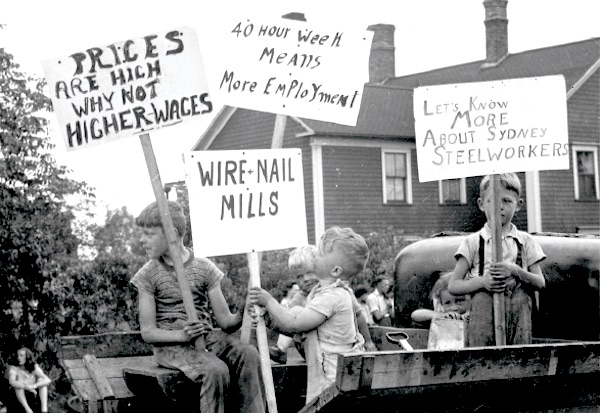 Strikes, lock-outs and harsh working conditions at the steel plant; the many duties of miners’ wives; union struggles to win a living wage; and the feelings of workers and their families when their steel mill or coal mine shuts down–these are just a few of the stories told in a new CD being released by Cape Breton University’s Centre for Cape Breton Studies next week. Two years in the making, Cape Breton Island Songs of Steel, Coal and Protest will be launched Wednesday, April 13 at the Centre for Cape Breton Heritage and Science in the Lyceum on George Street in Sydney, from 4-6pm, with CBC Cape Breton Mainstreet’s Wendy Bergfeldt broadcasting the celebration.
Strikes, lock-outs and harsh working conditions at the steel plant; the many duties of miners’ wives; union struggles to win a living wage; and the feelings of workers and their families when their steel mill or coal mine shuts down–these are just a few of the stories told in a new CD being released by Cape Breton University’s Centre for Cape Breton Studies next week. Two years in the making, Cape Breton Island Songs of Steel, Coal and Protest will be launched Wednesday, April 13 at the Centre for Cape Breton Heritage and Science in the Lyceum on George Street in Sydney, from 4-6pm, with CBC Cape Breton Mainstreet’s Wendy Bergfeldt broadcasting the celebration.
The new CD is Volume 2 in the Cape Breton Island Protest Song project that began when Cape Breton University professor Dr. Richard MacKinnon unearthed dozens of songs about steel, coal and protest written from as early as 1910 and as late as 2015. Volume 1, released in 2012, featured old protest songs written by steelworkers and coal miners set to new music by contemporary Cape Breton songwriters. The second volume follows the same path. The music to some of these songs was long lost. Local artists were asked if they would help bring these songs and the stories they tell, back to life. They enthusiastically jumped on board, writing and arranging the music and then recording the results. This new volume also includes contemporary songs, some written by former steelworkers and miners, MacKinnon found.
The artists are diverse. They include everyone from former coal miner and Men of the Deeps singer, Nipper MacLeod, to members of the Yarnells, Slowcoaster, Tom Fun Orchestra, and singer/songwriters Jordan Musycsyn, Breagh Mackinnon, Norma MacDonald, Ernest Laidlaw, Kev Corbett, Alicia Penny, Yvette Rogers and Jerome Aucoin. Other performers include protest folk singer Leo Feinstein, former steelworker / songwriters Hugh MacDonald and Tom Mills, well-known Cape Breton Island composers Angelo Spinazzola, Keith Mullins, John Campbelljohn, Dwayne Cote and Colin Grant. CBU professors Chris McDonald and Richard MacKinnon, and well-known songwriter, storyteller and playwright Ken Chisholm, also recorded songs for the record. The results are eclectic and exciting.
The oldest song is 116 years old, composed by Patrick J. Lynch just after a long, bitter strike in 1909. “Arise Ye Nova Scotia Slaves” discusses the battle for union formation when the UMWA was trying to represent the Cape Breton Miners. The song was originally recorded in 1940 at a UMWA union convention in Ohio by coal miner / singer Bob Stewart from Glace Bay. Nipper MacLeod sings the song on this CD. “Daughter’s Awake”, composed in 1923 by Becky Buhay, is essentially a feminist call to action. “Steelworkers Lament”, composed by steelworker John “Slim” McInnis and sung by Jordan Musycsyn, describes the harsh working conditions at the steel plant as a steelworker reflects on the hardship he has encountered for years at the plant just as he’s about to collect his pension. “Down at Sydney Steel” by contemporary blues man John Campbelljohn, discusses the attitudes and feelings of steelworkers and their families at the time the steel plant was shutting down.
Support for the project came from Cape Breton University Research Grants and CBU Work Placement research bursaries for students. The CDs are available for sale at the launch and at the Cape Breton Curiosity Shop on Charlotte Street in Sydney. They will also be available on-line. Historical context for the songs and numerous bonus tracks will be available at protestsongs.ca.

